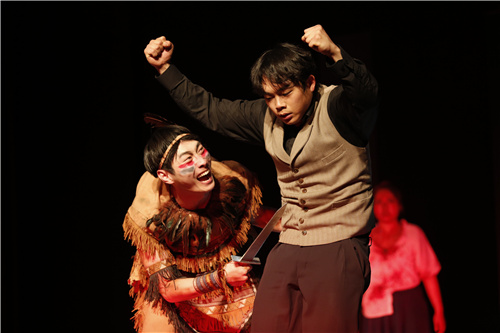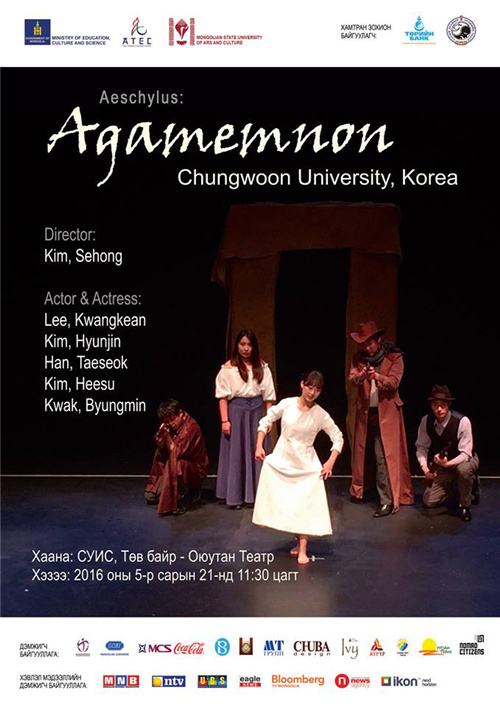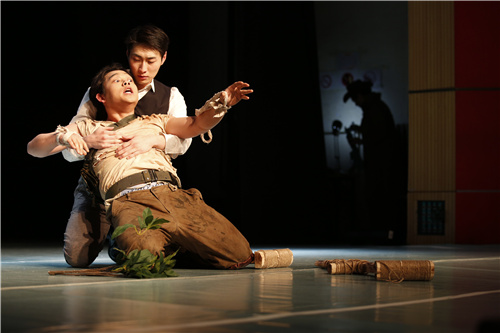
Director: Sehong Kim
Institution: College of Broadcasting & Arts, Chungwoon University
Venue: Oyutan theatre of MSUAC, Mongolia
Time: 11:30, May 20, 2016
Event: 4th Asian Theatre Schools Festival

Director’s Notes
THE WAR
He killed his daughter.
He made Troy destroyed.
He brought numerous sacrificed.
And he finally became the national hero.
It brings me dilemma.
What was that they achieved through the war they killed and been killed?
That was the name tag of murder.
That was the name tag of hero.
Look at the real war.
What is that they really achieved?
Is that an honour of community?
Or a death of human beings?
There is war anywhere in the world now.
What is that they really achieved through the war?
For whom they make the war?
I wish there will be no more tragedy like this play at any place whether the small or big community.
I wish there will be everlasting piece in the world.

Synopsis
Agamemnon begins with a Watchman on duty on the roof of the palace at Argos, waiting for a signal announcing the fall of Troy to the Greek armies. A beacon flashes, and he joyfully runs to tell the news to Queen Clytemnestra. When he is gone, the Chorus, made up of the old men of Argos, enters and tells the story of how the Trojan Prince Paris stole Helen, the wife of the Greek king Menelaus, leading to ten years of war between Greece and Troy. Then the Chorus recalls how Clytemnestra's husband Agamemnon (Menelaus' brother) sacrificed their daughter Iphigenia to the god Artemis to obtain a favourable wind for the Greek fleet.
The Queen appears, and the Chorus asks her why she has ordered sacrifices of thanksgiving. She tells them that a system of beacons has brought word that Troy fell the previous night. The Chorus give thanks to the gods, but wonder if her news is true; a Herald appears and confirms the tidings, describing the army's sufferings at Troy and giving thanks for a safe homecoming. Clytemnestra sends him back to Agamemnon, to tell her husband to come swiftly, but before he departs, the Chorus asks him for news of Menelaus. The Herald replies that a terrible storm seized the Greek fleet on the way home, leaving Menelaus and many others missing.
Agamemnon enters, riding in his chariot with Cassandra, a Trojan Princess whom he has taken as his slave and concubine. Clytemnestra welcomes him, professing her love, and orders a carpet of purple robes spread in front of him as he enters the palace. Agamemnon acts coldly toward her, and says that to walk on the carpet would be an act of hubris, or dangerous pride; she badgers him into walking on the robes, however, and he enters the palace.
The Chorus expresses a sense of foreboding, and Clytemnestra comes outside to order Cassandra inside. The Trojan Princess is silent, and the Queen leaves her in frustration. Then Cassandra begins to speak, uttering incoherent prophecies about a curse on the house of Agamemnon. She tells the Chorus that they will see their king dead, says that she will die as well, and then predicts that an avenger will come. After these bold predictions, she seems resigned to her fate, and enters the house. The Chorus' fears grow, and they hear Agamemnon cry out in pain from inside. As they debate what to do, the doors open, and Clytemnestra appears, standing over the corpses of her husband and Cassandra. She declare that she has killed him to avenge Iphigenia, and then is joined by her lover Aegisthus, Agamemnon's cousin, whose brothers were cooked and served to Aegisthus' father by Agamemnon's father. They take over the government, and the Chorus declares that Clytemnestra's son Orestes will return from exile to avenge his father.

